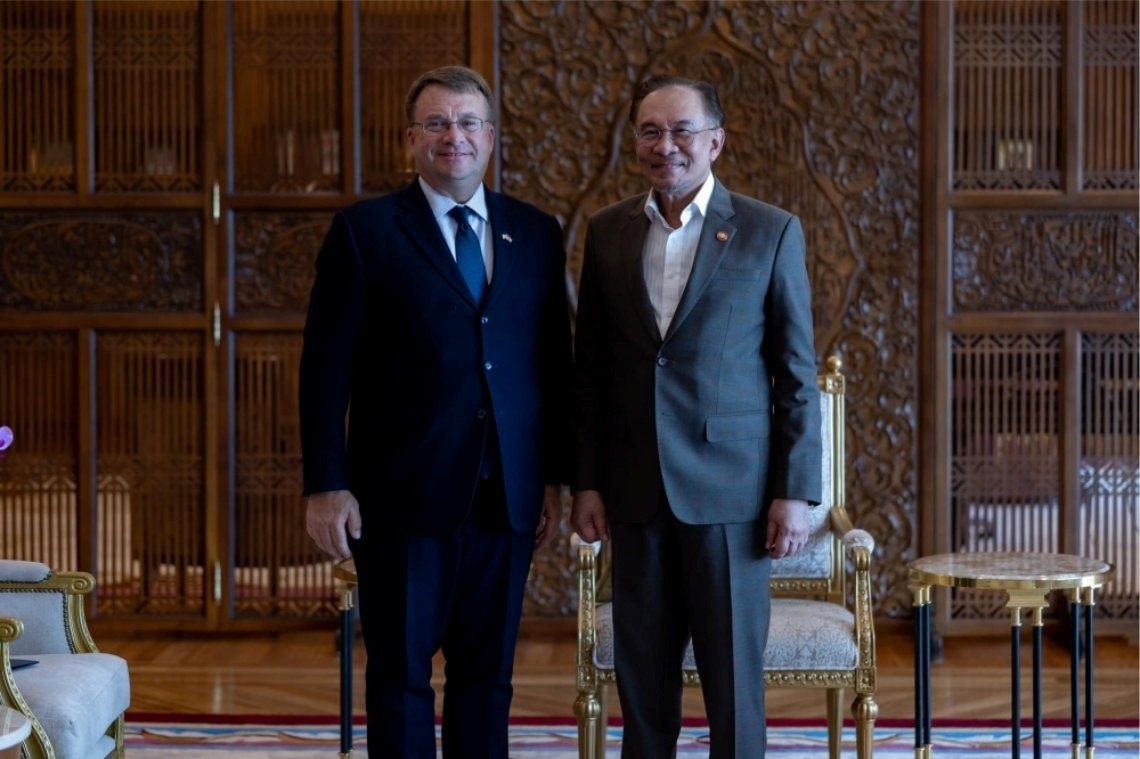“U.S. Army Pacific Commander Gen. Charles Flynn passes the IPAMS flag to Malaysian Army Lt. Gen. Huzaimi symbolizing the handover of responsibilities to conduct the 2025 IPAMS/SELF conferences in Kuala Lumpur. Malaysia will concurrently host the Indo-Pacific Armies Chiefs Conference (IPACC) bringing together land forces chiefs from all over the region.” Image & Caption Source: USARPAC Facebook
The self-proclaimed Sultanate of Sulu's recent initiative to invoke obsolete treaties with China, Spain, the United Kingdom, the United States, and the Netherlands in its $25 billion arbitration claim against Malaysia reveals a series of strategic miscalculations and a blatant pursuit of self-interest.
The move is emblematic of the broader instability within the Sultanate itself, where multiple self-declared heirs to the throne compete not on the basis of service or legitimacy, but on who can extract the greatest benefit from their contested claims. Much like the throne they seek to occupy, the Sultanate’s claim to sovereignty rests on fractured foundations and opportunistic motives.
This approach reflects a fundamental misunderstanding of both historical context and present-day geopolitical dynamics. Time and again, foreign interference—whether in the colonial era or in recent decades—has proven to be destabilizing rather than constructive. Such involvement routinely advances the strategic and economic interests of external powers while undermining the long-term welfare of local communities.
China: Ancient Symbolism, Modern Aggression
In its bid to justify international support, the Sultanate of Sulu is referencing a 600-year-old diplomatic correspondence from the Ming Dynasty. These ceremonial exchanges were symbolic gestures of regional courtesy, lacking the legal authority or binding obligations of modern international agreements. Moreover, the Sultanate never fulfilled the terms of this historical interaction, further weakening any claim to legitimacy.
Today, China's actions in the South China Sea illustrate its aggressive and self-interested foreign policy. The Chinese Coast Guard has repeatedly harassed Philippine vessels at Second Thomas Shoal, used water cannons to block resupply missions, and deployed military-grade lasers to disorient crews. China has also constructed and militarized artificial islands in contested waters while openly disregarding international arbitration rulings, including the 2016 Hague tribunal decision that invalidated China’s sweeping maritime claims in the South China Sea. These actions make it evident that Beijing prioritizes regional dominance over historical goodwill, rendering it an unreliable ally for the Sultanate’s cause.
United States: Rebuffed Overtures and Regional Realities
In contrast, the United States has demonstrated an active and enduring security commitment to the Philippines. In March 2025, the U.S., along with Japan and the Philippines, conducted coordinated naval exercises near Scarborough Shoal—a region at the heart of escalating tensions. During these drills, a Chinese frigate encroaching into Philippine waters was intercepted and turned away. This show of joint military resolve reinforced U.S. partnerships in the region and made clear that American strategic support remains aligned with established sovereign states like the Philippines and Malaysia—not an unrecognized entity like the Sultanate of Sulu relying on dubious historical claims.
While the Sultanate of Sulu clings to low-level diplomatic gestures—such as the email mentioned by Secretary-General Abraham Idjirani—its efforts reflect the lack of serious engagement it has received. Idjirani admitted that an emissary would now hand-deliver a letter previously sent to the U.S. Department of State, likely because the embassy ignored it or failed to offer any meaningful response.
In stark contrast, Malaysia’s government is already engaged in high-level diplomacy with global powers. On March 11, 2025, Prime Minister Datuk Seri Anwar Ibrahim met with U.S. Ambassador to Malaysia Edgard D. Kagan to discuss strengthening long-standing bilateral ties. Anwar also extended a formal invitation to U.S. President Donald Trump to attend the upcoming East Asia Summit—clear evidence that Malaysia already holds the diplomatic capital the Sultanate so desperately seeks.

Prime Minister Datuk Seri Anwar Ibrahim and the United States Ambassador to Malaysia Edgard D. Kagan met to discuss bilateral relations, March 11, 2025. Image Source: Facebook
✉ Get the latest from KnowSulu
Updated headlines for free, straight to your inbox—no noise, just facts.
We collect your email only to send you updates. No third-party access. Ever. Your privacy matters. Read our Privacy Policy for full details.
Extending this pattern of diplomatic miscalculation, the Sultanate’s invocation of the 1915 Carpenter-Kiram Treaty reveals a critical misunderstanding of diplomatic history. That agreement officially terminated the Sultanate's political authority, placing it under American colonial administration. Using this treaty to assert modern legitimacy ignores its actual purpose: the formal dissolution of the Sultanate’s sovereignty. In today’s context, the United States maintains robust strategic ties with both Malaysia and the Philippines, with full support of each nation state's modern sovereignty. Aligning itself with a dissolved political entity would stand in direct contradiction to modern diplomatic principles and serve no strategic value in today’s geopolitical landscape.
Spain: Legal Barriers and Diplomatic Incoherence
The Sultanate’s appeal to Spain similarly lacks credibility. Spain renounced all territorial claims in the region under the 1885 Madrid Protocol. Its historical presence was defined by colonization, religious imposition, and eventual withdrawal. Modern Spain has no legal basis or political incentive to revisit these colonial entanglements.
This is further evidenced by Spain’s active resistance to the Sultanate’s legal efforts. Spanish courts reversed a prior enforcement order issued by arbitrator Gonzalo Stampa, and legal challenges led by barrister Paul Cohen have further weakened the Sultanate’s position. Most tellingly, the Sultanate recently threatened to sue Spain for $18 billion, accusing it of interfering in the arbitration process. It is diplomatically unsound to issue legal threats against a nation while simultaneously seeking its support at the United Nations. This contradictory approach reflects a serious misjudgment of how international alliances and diplomatic norms operate.
It is diplomatically unsound to issue legal threats against a nation while simultaneously seeking its support at the United Nations.
United Kingdom: Colonial Profiteering, Modern Disinterest
The United Kingdom’s historical involvement in the region, primarily through the British North Borneo Company, was characterized by economic exploitation and colonial opportunism. The 1878 agreement with the Sultanate—whose language remains a subject of legal ambiguity—was used to justify British administrative control over North Borneo until its incorporation into Malaysia in 1963. During this period, the British profited extensively from resource extraction, particularly timber and tobacco, while investing minimally in local governance or infrastructure.
In the present day, Britain has little incentive to reinsert itself into a dispute rooted in its own colonial legacy. Doing so would risk reopening historical grievances and jeopardizing diplomatic and economic relations with Malaysia, a key Commonwealth ally and trading partner. The UK’s foreign policy focus is currently directed toward post-Brexit global partnerships and economic diversification. It is implausible that Britain would jeopardize those strategic goals by involving itself in a politically sensitive, legally uncertain, and diplomatically risky case. The Sultanate’s reliance on outdated documents and appeals to a former colonial master further underscores the lack of legitimacy and relevance of its claim in contemporary international law.
Netherlands: Irrelevant Legacy and Legal Absence
Among the most puzzling elements of the Sultanate’s strategy is its appeal to the Netherlands. The Dutch had no formal treaties or governance relationship with Sulu. Their presence in Southeast Asia was concentrated in the Indonesian archipelago, and their interactions with Sulu, if any, were minimal and informal. Invoking the Netherlands appears to be a last-ditch effort to enlist any former colonial power regardless of historical connection, legal precedent, or current relevance. With no strategic interest in the dispute and no colonial legacy in Sabah, the Netherlands is not a credible or realistic party to involve.
Sovereignty as a Pretext for Opportunism
Recently, the Sultanate of Sulu announced plans to seek support from other Mindanao Sultanates in pursuing its Sabah claim. According to spokesperson Idjirani, the three Sultanates of Mindanao have signed a Covenant of Unity, Collaboration, Cooperation, and Cultural Preservation—a symbolic gesture reaffirming their historical ties. However, these Sultanates should be wary of lending their names to a campaign built on shaky historical grounds and diplomatic misjudgment. Aligning with such a claim risks undermining their credibility both nationally and internationally, potentially alienating allies within the Philippine government and beyond. Malaysia's sovereignty over Sabah has been internationally recognized for over 60 years, and despite decades of rhetoric, the Sulu claimants have made no tangible legal or diplomatic gains. The Mindanao Sultanates should avoid wasting valuable resources and political goodwill on a cause that has shown itself to be ineffective, divisive, and increasingly out of step with regional interests.
The Mindanao Sultanates should avoid wasting valuable resources and political goodwill on a cause that has shown itself to be ineffective, divisive, and increasingly out of step with regional interests.
What becomes increasingly clear is that the Sultanate’s effort is not rooted in justice, sovereignty, or the well-being of its people. It is a calculated move to secure financial compensation by appealing to foreign powers with histories of exploitation. Ironically, the Sultanate’s approach mirrors the very colonial behavior it claims to oppose. This is not an act of reclaiming lost rights—it is a transactional strategy that seeks external validation for internal gain.
Even more troubling is the incoherent logic of simultaneously appealing to powers with diametrically opposed interests. Attempting to engage both China and the United States—rivals in an ongoing geopolitical competition—reveals a profound lack of strategic coherence. Rather than building a credible claim, the Sultanate undermines its own position through contradiction.
In attempting to resurrect obsolete alliances and colonial-era documents, the Sultanate of Sulu not only alienates current regional stakeholders but also entangles itself in a legacy of foreign domination and betrayal. For the people of Sulu, this is not a path toward empowerment—it is a repetition of history, driven not by foreign conquest, but by internal opportunism.
REFERENCES
Echeminada, P. (2025, March 31). Sultanate emissary returns to seek US support in Sabah claim. Daily Tribune. https://tribune.net.ph/2025/03/31/sultanate-emissary-returns-to-seek-us-support-in-sabah-claim
Echeminada, P. (2025, April 1). Sultanate of Sulu to invoke historic treaties, strengthen Mindanao alliance in Sabah claim push. https://tribune.net.ph/2025/04/01/sultanate-of-sulu-to-invoke-historic-treaties-strengthen-mindanao-alliance-in-sabah-claim-push
Malay Mail. (2025, March 11). Anwar discusses US-Malaysia ties, invites Trump to attend East Asia Summit. https://www.malaymail.com/news/malaysia/2025/03/11/anwar-discusses-us-malaysia-ties-invites-trump-to-attend-east-asia-summit/169278
Permanent Court of Arbitration. (2016, July 12). The South China Sea Arbitration (The Republic of the Philippines v. The People’s Republic of China). https://pca-cpa.org/en/cases/7/



